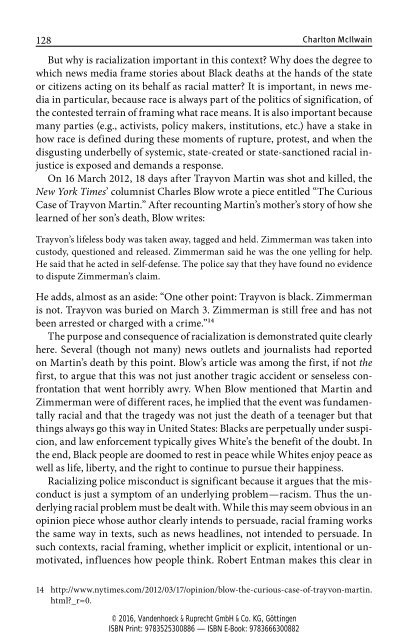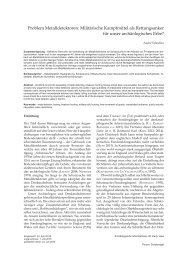Media and Minorities
9783666300882_ruhrmann_media_ebook_034247
9783666300882_ruhrmann_media_ebook_034247
Create successful ePaper yourself
Turn your PDF publications into a flip-book with our unique Google optimized e-Paper software.
128<br />
Charlton McIlwain<br />
But why is racialization important in this context? Why does the degree to<br />
which news media frame stories about Black deaths at the h<strong>and</strong>s of the state<br />
or citizens acting on its behalf as racial matter? It is important, in news media<br />
in particular, because race is always part of the politics of signification, of<br />
the contested terrain of framing what race means. It is also important because<br />
many parties (e.g., activists, policy makers, institutions, etc.) have a stake in<br />
how race is defined during these moments of rupture, protest, <strong>and</strong> when the<br />
disgusting underbelly of systemic, state-created or state-sanctioned racial injustice<br />
is exposed <strong>and</strong> dem<strong>and</strong>s a response.<br />
On 16 March 2012, 18 days after Trayvon Martin was shot <strong>and</strong> killed, the<br />
New York Times’ columnist Charles Blow wrote a piece entitled “The Curious<br />
Case of Trayvon Martin.” After recounting Martin’s mother’s story of how she<br />
learned of her son’s death, Blow writes:<br />
Trayvon’s lifeless body was taken away, tagged <strong>and</strong> held. Zimmerman was taken into<br />
custody, questioned <strong>and</strong> released. Zimmerman said he was the one yelling for help.<br />
He said that he acted in self-defense. The police say that they have found no evidence<br />
to dispute Zimmerman’s claim.<br />
He adds, almost as an aside: “One other point: Trayvon is black. Zimmerman<br />
is not. Trayvon was buried on March 3. Zimmerman is still free <strong>and</strong> has not<br />
been arrested or charged with a crime.”14<br />
The purpose <strong>and</strong> consequence of racialization is demonstrated quite clearly<br />
here. Several (though not many) news outlets <strong>and</strong> journalists had reported<br />
on Martin’s death by this point. Blow’s article was among the first, if not the<br />
first, to argue that this was not just another tragic accident or senseless confrontation<br />
that went horribly awry. When Blow mentioned that Martin <strong>and</strong><br />
Zimmerman were of different races, he implied that the event was fundamentally<br />
racial <strong>and</strong> that the tragedy was not just the death of a teenager but that<br />
things always go this way in United States: Blacks are perpetually under suspicion,<br />
<strong>and</strong> law enforcement typically gives White’s the benefit of the doubt. In<br />
the end, Black people are doomed to rest in peace while Whites enjoy peace as<br />
well as life, liberty, <strong>and</strong> the right to continue to pursue their happiness.<br />
Racializing police misconduct is significant because it argues that the misconduct<br />
is just a symptom of an underlying problem — racism. Thus the underlying<br />
racial problem must be dealt with. While this may seem obvious in an<br />
opinion piece whose author clearly intends to persuade, racial framing works<br />
the same way in texts, such as news headlines, not intended to persuade. In<br />
such contexts, racial framing, whether implicit or explicit, intentional or unmotivated,<br />
influences how people think. Robert Entman makes this clear in<br />
14 http://www.nytimes.com/2012/03/17/opinion/blow-the-curious-case-of-trayvon-martin.<br />
html?_r=0.<br />
© 2016, V<strong>and</strong>enhoeck & Ruprecht GmbH & Co. KG, Göttingen<br />
ISBN Print: 9783525300886 — ISBN E-Book: 9783666300882







